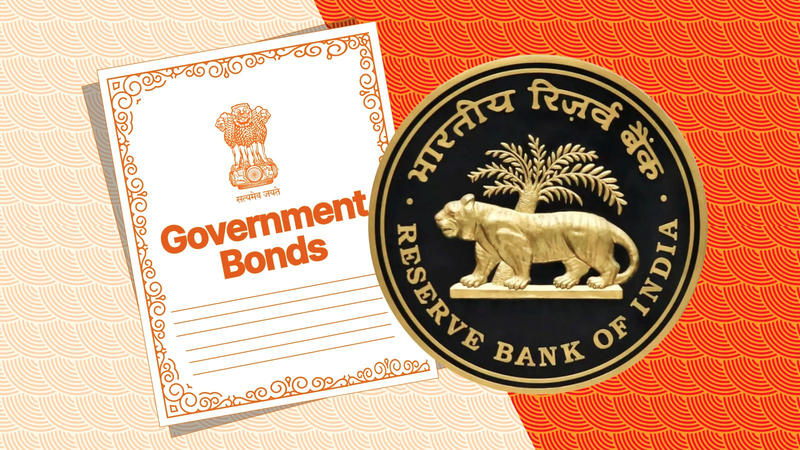Published 17:54 IST, December 3rd 2024
Government Bonds: Lend Money To GoI And Earn Passive Income
Government bonds offer a low-risk investment option with guaranteed returns, providing a stable income stream backed by the Government of India.

Reliable Investment Option: Are you looking for a way to grow your money without taking on too much risk? Why not lend money to the government? So, government bonds are where you lend money, and not only do you get it back, but you also earn interest, and the promise of repayment is guaranteed by the Government of India.
Government bonds are a low-risk investment option, where you can park your surplus funds and earn interest without worrying about defaults or strained relationships.
"Government bonds are ideal for investors who want stable returns with minimal risk. They are particularly useful for conservative investors, retirees, or anyone looking to add a safe, predictable income stream to their portfolio," said Ravi Singh, SVP, Retail Research Religare Broking Ltd.
"While government bonds may not offer the high returns of stocks, they do offer a guaranteed return, and the principal is always repaid at maturity, making them a safer option in uncertain times," Singh added.
What are government bonds?
At its core, a government bond is a type of debt security issued by the government to raise funds. When you buy a government bond, you're essentially lending your money to the government, which promises to repay the principal amount on a specific date in the future (the maturity date). In return, you receive interest payments over the life of the bond.
To simplify, think of a government bond as a piece of paper that represents a loan you are making to the government. For example, the government might issue a bond with a face value of Rs 100, but you could purchase it for Rs 97. The Rs 3 difference is your profit, as the government guarantees to buy back the bond at its face value of Rs 100 when it matures.
Why buy government bonds?
One of the most appealing aspects of government bonds is their safety. Since the Government of India guarantees repayment, the risk of default is extremely low. Unlike lending money to a friend, where there’s always the risk of not getting your money back, government bonds provide peace of mind.
Government bonds offer predictable returns in the form of interest payments. While these returns might not be as high as stock market investments, they are higher than the interest earned from savings accounts.
You can sell these bonds in the secondary market if you need access to your money before the bond’s maturity date. For instance, if you buy a bond for Rs 97 and the market price rises to Rs 99 a year later, you can sell the bond and make a profit of Rs 2.
How do government bonds work?
When the government needs funds, it issues bonds to raise capital. For example, if the Government of India needs money for infrastructure projects or welfare programs, it may issue bonds through the Reserve Bank of India ( RBI ).
These bonds are sold at a discount to their face value. So, if you purchase a Rs 100 bond at Rs 97, the Rs 3 difference becomes your profit. Over the life of the bond, you will receive periodic interest payments based on the coupon rate. The coupon rate is the interest rate set by the government when issuing the bond.
At maturity, the government promises to repay the face value of the bond. So, if you bought the bond for Rs 97, you’ll receive ₹100 when it matures, plus the interest payments received throughout the life of the bond.
Types of government bonds
Long-Term Bonds- These bonds typically have a maturity period of 5, 10, or 20 years. They are ideal for investors looking for stable, long-term returns.
Short-Term Bonds- These bonds mature in less than a year and are a good option for those seeking quick returns.
Zero-Coupon Bonds- These bonds don’t offer regular interest payments. Instead, they are sold at a discount to their face value and redeemed at full value at maturity. The difference is your interest.
Inflation-Linked Bonds- These bonds offer returns linked to inflation, making them a good hedge against rising prices.
How to invest in government bonds?
Investing in government bonds has become much easier for retail investors with RBI Direct platform.
- To begin, visit the RBI Direct website and register an account. This process is simple, and you’ll need to provide basic personal details.
- After registering, browse the list of available government bonds. You’ll find bonds with various maturity dates and interest rates, so you can choose the one that fits your financial goals.
- Once you've selected a bond, enter the amount you wish to invest and confirm your order. The bond will then be added to your portfolio.
- After investing, you can monitor your bonds through the RBI Direct portal. This platform allows you to keep track of your bonds and manage them efficiently without needing a demat account.
Before investing in government bonds, here are a few important terms to know. The coupon rate is the interest rate the bond pays, usually yearly or half-yearly. Yield is the return you get based on the bond’s price and interest payments. The maturity date is when the government will repay the bond's full value. Lastly, the secondary market is where you can buy or sell bonds before they mature.
Updated 17:57 IST, December 3rd 2024